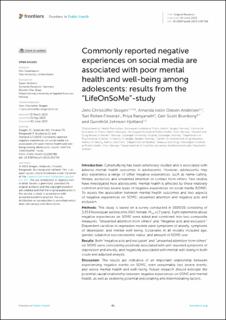| dc.contributor.author | Skogen, Jens Christoffer | |
| dc.contributor.author | Andersen, Amanda Iselin Olesen | |
| dc.contributor.author | Finserås, Turi Reiten | |
| dc.contributor.author | Ranganath, Priya | |
| dc.contributor.author | Brunborg, Geir Scott | |
| dc.contributor.author | Hjetland, Gunnhild Johnsen | |
| dc.date.accessioned | 2024-03-20T10:33:36Z | |
| dc.date.available | 2024-03-20T10:33:36Z | |
| dc.date.created | 2023-07-03T11:08:23Z | |
| dc.date.issued | 2023 | |
| dc.identifier.issn | 2296-2565 | |
| dc.identifier.uri | https://hdl.handle.net/11250/3123335 | |
| dc.description.abstract | Introduction: Cyberbullying has been extensively studied and is associated with adverse mental health outcomes in adolescents. However, adolescents may also experience a range of other negative experiences, such as name-calling, threats, exclusion, and unwanted attention or contact from others. Few studies have investigated how adolescents’ mental health is affected by these relatively common and less severe types of negative experiences on social media (SOME). To assess the association between mental health outcomes and two aspects of negative experiences on SOME; unwanted attention and negative acts and exclusion.
Methods: This study is based on a survey conducted in 2020/21 consisting of 3,253 Norwegian adolescents (56% female, Mage = 17 years). Eight statements about negative experiences on SOME were asked and combined into two composite measures: “Unwanted attention from others” and “Negative acts and exclusion.” Dependent variables in regression models were symptoms of anxiety, symptoms of depression, and mental well-being. Covariates in all models included age, gender, subjective socioeconomic status, and amount of SOME-use.
Results: Both “negative acts and exclusion” and “unwanted attention from others” on SOME were consistently positively associated with self-reported symptoms of depression and anxiety, and negatively associated with mental well-being in both crude and adjusted analysis.
Discussion: The results are indicative of an important relationship between experiencing negative events on SOME, even presumably less severe events, and worse mental health and well-being. Future research should extricate the potential causal relationship between negative experiences on SOME and mental health, as well as exploring potential precipitating and intermediating factors. | en_US |
| dc.language.iso | eng | en_US |
| dc.publisher | Frontiers | en_US |
| dc.rights | Navngivelse 4.0 Internasjonal | * |
| dc.rights.uri | http://creativecommons.org/licenses/by/4.0/deed.no | * |
| dc.title | Commonly reported negative experiences on social media are associated with poor mental health and well-being among adolescents: results from the “LifeOnSoMe”-study | en_US |
| dc.type | Journal article | en_US |
| dc.type | Peer reviewed | en_US |
| dc.description.version | publishedVersion | en_US |
| dc.rights.holder | Copyright 2023 The Author(s) | en_US |
| dc.source.articlenumber | 1192788 | en_US |
| cristin.ispublished | true | |
| cristin.fulltext | original | |
| cristin.qualitycode | 1 | |
| dc.identifier.doi | 10.3389/fpubh.2023.1192788 | |
| dc.identifier.cristin | 2160265 | |
| dc.source.journal | Frontiers in Public Health | en_US |
| dc.relation.project | Stiftelsen Dam: 2021/FO347287 | en_US |
| dc.relation.project | Norges forskningsråd: 319845 | en_US |
| dc.identifier.citation | Frontiers in Public Health. 2023, 11, 1192788. | en_US |
| dc.source.volume | 11 | en_US |

